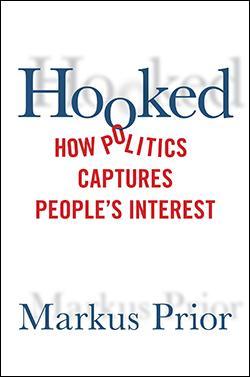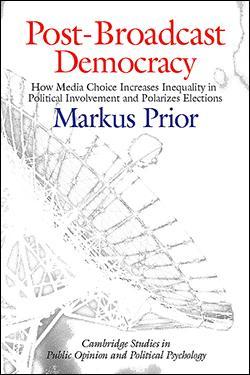Hooked: How Politics Captures People’s Interest
Cambridge University Press. 2019
Amazon
Online Supplementary Materials
Political interest is the strongest predictor of 'good citizenship', yet hardly anything is known about it. For the first time in over three decades, here is a study explaining what political interest is, where it comes from, and why it matters. Providing the most thorough description available of political interest in four Western democracies this study analyzes large household panel data sets rarely used in political science to explain how interest develops in people's lives. In an accessible manner, the book's analytical approach pushes applied social scientists to consider how panel data can be used to better understand political behavior. It does so in a way that doesn't gloss over complexities, and explains them in straightforward language. Advanced statistical methods are presented informally, accompanied by graphical illustrations that require no prior knowledge to understand the methods used.
- Winner of the 2020 Robert E. Lane Award given by the Political Psychology Section of the American Political Science Association for the best book in political psychology published in the past year.
- Winner of the 2020 Alexander George Book Award given by the International Society of Political Psychology for the best book published in the field of political psychology during the previous calendar year.

Post-Broadcast Democracy: How Media Choice Increases Inequality in Political Involvement and Polarizes Elections
Cambridge University Press. 2007
Amazon
The media environment is changing. Today in the United States, the average viewer can choose from hundreds of channels, including several twenty-four hour news channels. News is on cell phones, on iPods, and online; it has become a ubiquitous and unavoidable reality in modern society. The purpose of this book is to examine systematically, how these differences in access and form of media affect political behavior. Using experiments and new survey data, it shows how changes in the media environment reverberate through the political system, affecting news exposure, political learning, turnout, and voting behavior.
- Winner of the 2010 Doris Graber Book Award given by the Political Communication Section of the American Political Science Association for the best book in Political Communication published in the last ten year.
- Winner of the 2009 Goldsmith Book Prize awarded by the Joan Shorenstein Center on the Press, Politics and Public Policy, Harvard University.
- Winner of the Frank Luther Mott Research Book Award given by the National Honor Society in Journalism and Mass Communication for one of the top three books on journalism and mass communication of 2007.
- 2007 Outstanding Academic Title, Choice Magazine
- Excerpt reprinted in: Doris Graber, ed. (2010). Media Power in Politics. 6th edition (pp. 153-164). Washington, DC: CQ Press.


